https://econsultancy.com/stats-roundup-coronavirus-impact-on-marketing-ecommerce-advertising/
Of course, this has wide-ranging ramifications for marketing, advertising and ecommerce – as well as a number of other sectors like travel, entertainment and FMCG.
To help marketers keep on top of what this means for them, their jobs and their industry, we’re collecting together the most valuable and impactful stats in this roundup, updated on a weekly basis since 20th March.
Read on for statistics on ad revenue, ecommerce usage, grocery spending, media streaming subscriptions, social messaging and much, much more.
And for stats on an even wider array of topics, don’t forget to check out the Internet Statistics Database.
Travel
Experts predict a 15% year-on-year decline in travel ad revenue
Expert analyst Rob Sanderson from Loop Capital Markets predicts that Google and Facebook’s ad revenue will be severely impacted by the decrease in ad spend by travel brands (as reported by Search Engine Land on 10th March).
According to his research, Google could see a 15% drop in year-on-year ad revenue during Q1 from lower spending in the travel sector as customers hold off from booking holidays until the outbreak has passed. This drop could increase to 20% by the end of Q2 depending on the duration and scale of the outbreak in key markets around the world.
Google and Facebook are likely to take an additional hit from other industries who have been affected by changes in consumer behaviour since the Coronavirus spread globally. Analysts Laura Martin and Dan Medina from the Needham Research Institute claim there is already evidence that ad spend has decreased in sectors such as entertainment, retail and FMCG as cinemas and restaurants close, consumers avoid malls and people alter their spending habits.
Combining this with reduced spend in the travel industry, it could represent between 30-45% of Facebook’s overall ad revenue.
Furthermore, continued uncertainty could cause marketers in other areas to reconsider their ad spend and may consolidate with the hardest hit industries to produce an even bleaker picture for the revenues of Facebook and Google over the coming quarters.
How travel and tourism brands are reacting to coronavirus
55% of frequent vacationers ‘may’ or will ‘likely’ book future holidays while confined to their homes during the coronavirus outbreak
Despite an unprecedented number of people cancelling pre-booked holidays and choosing not to travel, it doesn’t mean they haven’t stopped looking at holidays altogether, according to a report from Izea published on 18th March.
In fact, 55% of US consumers who usually travel five or more times per year say they ‘may’ or will ‘likely’ purchase a future holiday while confined to their homes during the coronavirus outbreak. This likelihood rises to 61% for those who travel frequently for business purposes.
The data also reveals how future booking intentions differ depending on how far in the future they are. Thirty-eight percent of US consumers say that they ‘would never buy’ a non-refundable hotel or plane reservation if the required travel date fell within the next 1-4 weeks. The number declines steadily as the number of weeks pass. Once the travel date falls over nine months from now (around Christmastime), just over one-fifth still refuse to make non-refundable bookings but more require increasingly higher discounts of up to 50% in order to be persuaded.
This suggests that consumers will take a while to come back around to the idea of travelling abroad on a non-refundable basis once the coronavirus has died down; certainly longer than a timeframe of 9 months. As a result, holiday companies must look to the future and focus on targeting loyal, frequent customers (whether travelling for business or pleasure) who will more likely take the risk sooner than more casual vacationers.

Retail & FMCG
50% of Chinese and 31% of Italian consumers say they’re using ecommerce ‘more frequently’
Respondents from affected regions have revealed their lifestyle changes, opinions and reactions brought about by the pandemic in a study from Ipsos MORI conducted from 12th-14th March.
While footfall in physical retail stores is understandably decreasing due to social distancing measures, this is an interesting time for ecommerce. According to Ipsos MORI, 50% of Chinese and 31% of Italian consumers say they’re shopping online ‘more frequently’ to purchase products they’d usually buy in-store. Other countries such as Vietnam, India and Russia have also seen their populations turning to ecommerce more often to shop – with increase of use measured at 57%, 55% and 27% respectively.
Only 18% of UK respondents said that they were using online stores more frequently, with close to half reporting there was ‘no change’ in their ecommerce habits.
It’s been common knowledge that, in some regions, many consumers have been stockpiling, whether via online shopping channels or brick-and-mortar supermarkets. In fact, those from the UK are the most likely to blame stockpiling for shortages of food and other essential items (89%) than any other country. France (87%) and Australia (86%), which have also experienced problems with panic buying, came close second and third. Meanwhile China (46%) and India (40%) commonly cite supply-chain issues as the reason for shortages, despite more respondents from Asian areas actively stockpiling than those from Europe and the US.
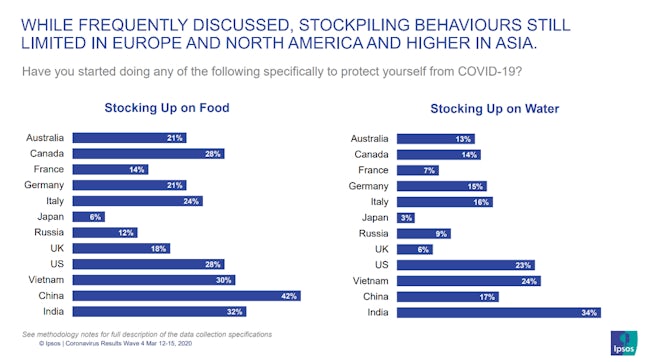
Chart via Ipsos MORI
This data on ecommerce habits in virus ‘hot spots’ may help to predict what is to come for those countries still grappling with the earlier stages of the pandemic, such as France, Germany, the UK and the US.
UK retail industry forecast to lose £12.6bn in 2020
A new forecast by GlobalData published on 24th March suggest that UK retail sales are set to dramatically plunge in 2020 due to the coronavirus pandemic.
According to the forecast, the overall UK retail industry will see a loss of £12.6bn this year. Clothing and footwear brands are predicted to suffer the most, seeing a sales decline of 20.6% to £11.1bn. In contrast, the UK food and grocery market is forecast to grow 7.1% in 2020, which is £6.8bn up on the previous forecasted annual spend.
How is coronavirus impacting the retail industry?
US grocery apps experience record numbers of daily downloads
Grocery apps in the US have experienced record numbers of daily downloads in March, according to app analytics company Apptopia.
As the virus begins to take its toll in the US, it appears that more and more consumers are turning to online grocery delivery, rather than risking a trip out themselves. Sunday 15th March saw a record number of average downloads, with Instacart experiencing a 218% increase when compared to download activity in February. Earlier this month, the brand claimed that overall sales growth had improved tenfold during the first week of March compared to the previous week – results which no doubt have been aided by increased interest in its app.
Walmart, which has a standalone grocery app called ‘Walmart Grocery’, saw a 160% growth in app downloads over the same period, despite an announcement from the brand that it will be phased out and consolidated into a single flagship app by the summer months.
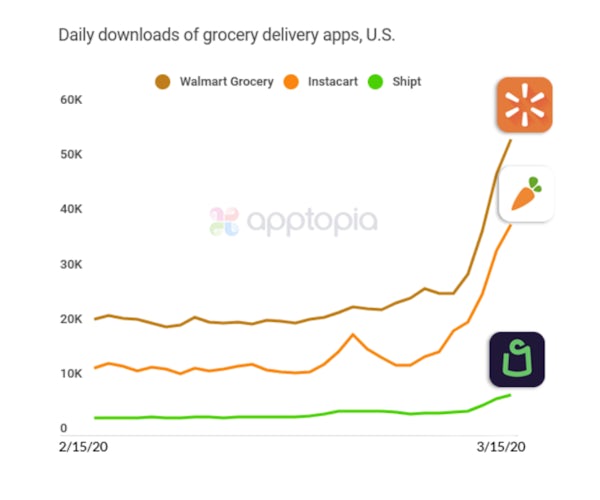
Graph via Apptopia
Meanwhile US retail giant Target experienced similar month-on-month growth in its mobile app downloads Shipt (124%) and Target (98%) as shoppers order essentials to their homes. It is thought that the introduction of contact-free delivery options by big brands has had a partial role to play when it comes to recent app demand.
This trend appears to show no signs of slowing and it would be unsurprising to see new download and usage records being set in the future as the situation worsens in the region.

UK shoppers spend an additional £467m on groceries amid coronavirus fears
New data from Nielsen has revealed that grocery sales at UK supermarkets during the week ending 14th March increased by more than 22% compared to the same period in 2019. This equates to an additional £467m more in purchases than this time last year.
This rise has been attributed to stockpiling amid fears about the spread of coronavirus (and the threat of imminent lockdown). Higher spend on certain categories demonstrates this. For example, household and pet care items saw a 65% increase in sales compared to the same period last year, while sales of non-perishable groceries increased by 62%. Nielsen also states that there was also a significant increase in sales of frozen food (33%), as well as for beer, wine and spirits (11%).
In terms of individual product sales (and a week by week comparison), sales of children’s medicine grew by 228% for the week ending 14th March versus the week before that. However, the biggest weekly growth was in long-life milk which increased sales by 181%.
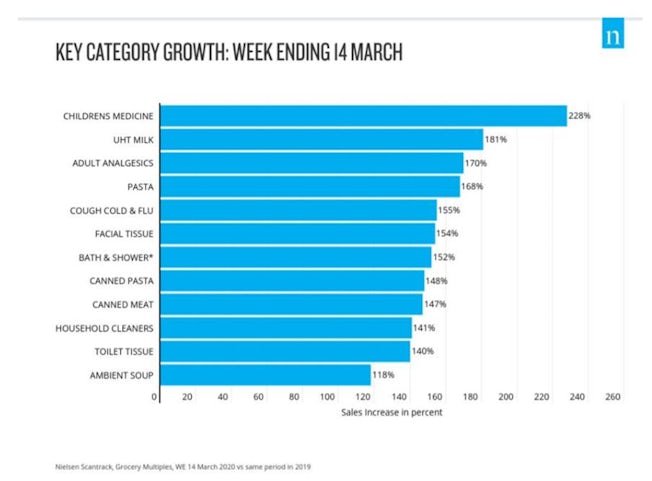
Advertising
Chinese ad spend growth forecast re-evaluated to 3.9% from 6.9%
Industry experts have re-evaluated the Chinese ad spend growth forecast as the impact of the coronavirus comes to light, according to the March spend forecast from Dentsu Aegis Network. It is now predicted to reach 3.9% year-on-year, falling from a much larger previous estimate of 6.9%.
While the coronavirus is very much to blame for this, there are also other factors at play such as slower retail sales and a decline in economic output which has been an ongoing trend in the region for a number of years. However, the newly predicted 3.9% growth remains higher than that of 2019, (despite the pandemic) and this is mostly driven by a spike in mobile ad spend which is expected to rise by 17.6%.
Although China has certainly borne the worst of the brunt, ad spend estimates have been revised in other regions of the world. Since the last forecast was released in June 2019, estimates for the APAC region have declined by -0.7%, while UK estimates have declined by -0.6% (although this may be more due to Brexit uncertainty than the coronavirus).
Meanwhile, ad spend in areas of mainland Europe such as Spain, Italy and Germany are expected to see an overall decrease in ad spend growth this year and in 2021. Italy is predicted to be worst hit, after a national ban on gambling advertising came into effect last year, followed this year by the coronavirus outbreak.
Imagery of human interaction declines 27.4% in social ads
A new study by Pattern89, published on 24th March, has noted a shift in the type of imagery brands are using in social media ads since the start of the coronavirus pandemic. Analysing more than 1,100 brands and advertisers active on Facebook and Instagram, Pattern89 found that there are 27.4% fewer images and videos ads of models displaying human interaction (such as hugging or shaking hands).
Since 12th March, imagery featuring people washing hands or faces, and images and videos that display water splashing or cleaning have risen at six times the normal rate. Meanwhile, headline and body copy mentioning “Sports & Fitness” topics has quadrupled (rising from 5.7% to 21% of all ads) since March 12th. Similarly, electronics (such as smartphones or TVs) are now appearing in 39% of social ads.

How brands are encouraging social distancing
Entertainment
Netflix’s YoY subscription growth in US and Canada now expected to reach more than double previous estimates
Data from expert analyst Michael Olson of Piper Sandler, as reported by NASDAQ on 8th March, predicts that Netflix’s year-on-year subscriptions growth for the US and Canadian markets is now expected to reach more than double previous predictions of 1.6%.
Indeed, Olson expects this figure to reach closer to 3.8% as the public are encouraged to stay mostly indoors during the outbreak and therefore resort to popular streaming platforms. The research also suggests that the growth of international subscriptions will rise to 30.9% year-on-year compared to previous estimations of 29.9%.
Streaming services are potentially one of the very few sectors that are set to withstand or even benefit from the coronavirus as it continues to spread. It will be fascinating to see what impact staying at home will have on major providers like Netflix, Prime Video, Now TV and Hulu once enough data has been collected.
PC gaming platform Steam attracts record number of concurring global users in mid-March
According to data from SteamDB, Steam (the global PC gaming platform) attracted a cool 20.3 million concurring users on Sunday 15th March – setting a record for the number of users online at any one time in its 16-year history.
#Steam has just reached a new concurrent online user record of 20 million, with 6.2 million currently in-game, likely due to many people staying at home due to the #coronavirus.https://t.co/bzLMfMOJvD#COVID19
— Steam Database (@SteamDB) March 15, 2020
https://platform.twitter.com/widgets.js
Despite this record being broken on a weekend, when gamers have more time to play, it is likely that the worldwide Coronavirus pandemic has had an impact on the steady increase in online activity as many more find themselves at home than usual.
Counter-Strike: Global Offensive, a particularly popular eight year-old game available on the platform, also reached a record number of simultaneous players on the same date.
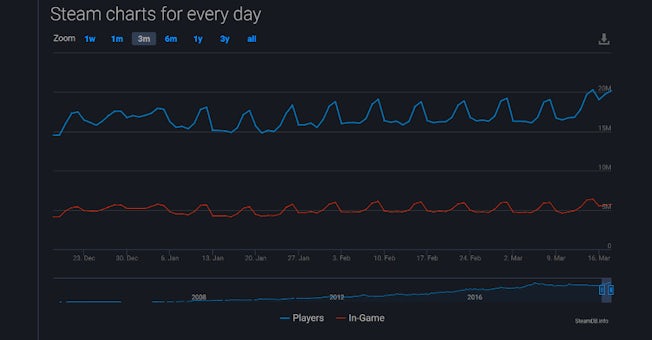
Graph via SteamDB
It seems that some of the global population have turned to online gaming as an attempt to relieve boredom (and to socialise) while stuck inside. This could be good news for the gaming industry in a time when other market sectors are struggling as the general public make significant changes to their lifestyles in order to help slow its spread.
However, in light of the vast cancellation of events, including eSports tournaments, and the uncertainty facing hardware-reliant games companies like Nintendo, it remains to be seen what the true impact of the virus will be on this industry going forward.

Coronavirus: amidst conference postponements, some events are going virtual – but will they work?
Employment & recruitment
Young people in the UK most worried about impact of coronavirus on jobs and wages
A new study by YouGov has revealed that people aged 18 to 24 are more worried than any other age group about the impact coronavirus will have on the job market in the long-term. According to figures published on 24th March, in a survey of 1,619 adults in the UK, seven in ten 18 to 24-year-olds say they worry that the coronavirus will cause higher unemployment for a long time. This figure drops for every other subsequent age group.
The survey also found that 54% of 18 to 24 year olds believe that coronavirus will affect wages in the long-term, compared with 43% aged 50 and over.
As the pandemic continues to spread, anxiety levels about the economy are rising. The number of people worried that coronavirus will cause long-term unemployment jumped from 26% to 62% in just the space of a week. Similarly, two thirds of Brits now believe there will be lasting damage to the economy, which is up from 36% a week before.
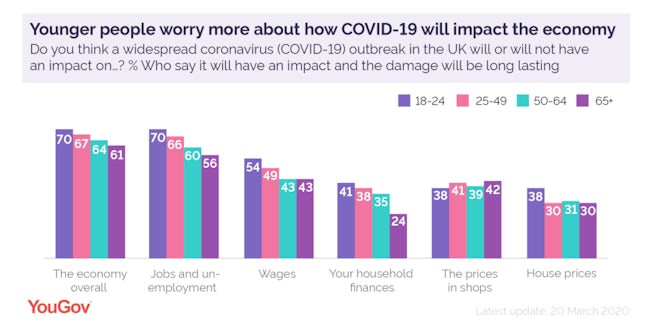
Coronavirus drives surge in job applications to retailers
Retailers have seen their normal rate of job applications skyrocket in the past week or so, with the majority of applications coming from people in the hospitality industry who have just been made redundant.
According to TribePad, the daily rate of applications to retail businesses increased from 5,000 per day to more than 200,000 on Friday 20th March. After supermarkets issued an urgent appeal for staff, Saturday evening saw another big spike, with more than 300 people applying for roles every minute (compared with nine per minute in the previous week).
While hiring activity in the food and grocery sector is on the up, other sectors are seeing a downturn. TribePad data shows that job applications have dropped by 73% in recruitment, 33% in hospitality, and 23% in healthcare compared to the same week in 2019. Meanwhile, organisations in other sectors like fashion retail and hospitality have paused all recruitment activity.
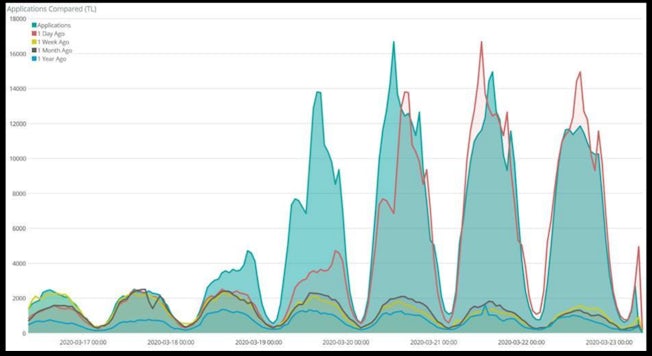
Social media
Activity on Facebook’s messaging apps has increased more than 50% in hardest-hit countries during the past month
In a blog post published on 24th March, Facebook outlined how the coronavirus pandemic has resulted in a surge in usage of its messaging apps.
According to Facebook data, total messaging has increased more than 50% over the last month in many of the countries hit hardest by the virus. Similarly, in places hit hardest, voice and video calling has more than doubled on Messenger and WhatsApp. In Italy, specifically, Facebook has seen 70% more time spent across its apps since the crisis started, while Instagram and Facebook Live views doubled in a week. Messaging in Italy also increased over 50%, and time in group calling (with three or more participants) increased by over 1,000% during the last month.
Despite this, Facebook stated that its business is being adversely affected by coronavirus, in particular its ad platform. This has been echoed by Cowen & Co, which forecasts Facebook ad revenue for 2020 to be $67.8 billion, which marks a drop of $15.7 billion from Cowen’s previous forecast.

45% of global consumers spending more time on social media
A new report by GlobalWebIndex highlights changes in consumer behaviour during the coronavirus pandemic. In a global survey of over 13,000 consumers, conducted between 16th-20th March, GWI found that 95% of consumers are spending more time on in-home media consumption. Unsurprisingly, there’s been a marked increase in watching news coverage, with two in three global consumers spending more time doing this activity.
Across the 13 countries involved in the survey, over 50% are watching more streaming services, 45% are spending more time on messaging services, and almost 45% are devoting more time to social media. Interestingly, over 10% also say they are creating and uploading videos.
Elsewhere, the report notes that views on advertising are polarised. When asked if brands should carry on advertising as normal, just over a third agree, just over a quarter disagree and just over a third aren’t sure. Gen Zs (38%), men(39%) and the higher income group (39%) are the most likely to agree that advertising should continue as normal.
The post Stats roundup: coronavirus impact on marketing, ecommerce & advertising appeared first on Econsultancy.
Be First to Comment